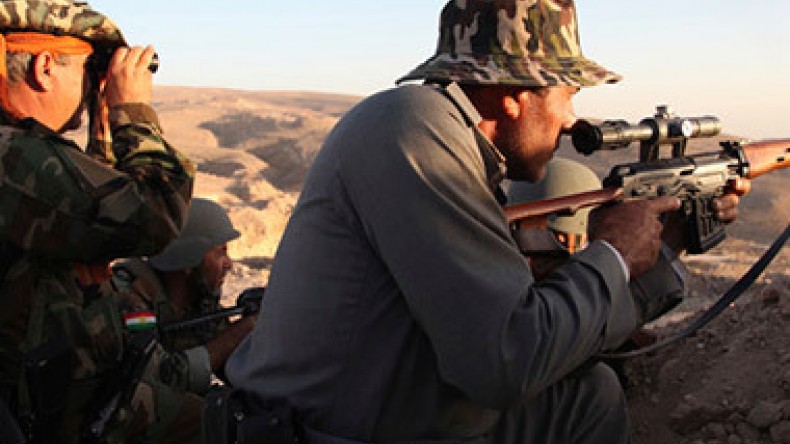
The Ultima Irratio: On Germany’s decision to arm Iraqi Kurds
By Mark Bergfeld
From RT
In Germany, every school child knows that September 1, 1939 marks the date of Hitler’s invasion of Poland. It is also the day that peace activists and campaigners celebrate World Peace Day, with demonstrations all over Germany.
This year the German parliament ‘commemorated’ the beginning of World War II by debating whether to send armor-piercing weaponry to a battalion of 4000 Iraqi Kurds fighting ISIS.
This is not a historic coincidence. This is the logical conclusion of the continuous militarization of German foreign policy since the invasion of Kosovo in 1999, and the war in Afghanistan in 2001. As former chancellor Willy Brandt would have put it: The ultima irratio!
Merkel and four of her ministers had already decided to send weapons to Peshmerga fighters ahead of the parliamentary debate on Sunday evening. For this, she did not require approval from the German Bundestag. Seemingly, Merkel and co. did not care about the opinion polls either. These showed that 60 percent of the German population is against this form of military intervention.
With parliament relegated to a debating chamber, and the German public to mere spectators, Merkel’s government is the first to send German arms into a warzone. But weapons exports are nothing new. Germany is the third largest weapons exporter in the world. While in recent years, Merkel has not been keen to bomb innocent children, the export of weaponry doubled between 2005 and 2009. Merkel’s government has supplied the State of Israel with arms against the Palestinians, and Saudis with tanks to crush the Bahraini uprising in 2011.
Subsequent governments have always sought to prove themselves as reliable partners to the USA. Even when they have not supplied ground troops or military equipment, as with the US invasion of Iraq in 2003, German intelligence services willingly aided – and contributed to the destabilization of the Middle East.
As much as politicians would like to cloak the export of heavy weaponry in the language of helping the oppressed Kurds nothing could be further from the truth. In the past, Germany has supplied Turkey - its close ally and NATO partner - with weaponry to crush the Kurdish PKK in Eastern Anatolia. No German or US government has ever stood with the Kurdish people in Turkey or Iraq until ISIS laid siege on the oil and gas fields in Northern Iraq.
It is questionable whether Peshmerga fighters are up to the task. Recently, they abandoned the mountains when Yazidis sought refuge there. Instead the PKK/YPG had to step in to protect the Yazidis’ lives. A horror scenario for Germany and its allies which consider the PKK a terrorist organization.
Germany is unlikely to change its relation to the PKK any time soon - even though there are plenty of reasons to do so. Until this day, Turkey continues to facilitate the entry of European jihadists into Syria, closed its border to Iraqi and Syrian refugees and has been holding aid deliveries at the border for the last three weeks. Worried about the deep economic ties between Germany and Turkey, Merkel has not lost a word about it.
By providing Peshmerga fighters with 40 machine guns, 10,000 hand grenades 30 Milan anti-tank missile systems equipped with 500 missiles, and five Dingo armored cars Germany is pouring fuel on to the flames. This will neither stop ISIS nor facilitate a peaceful solution in the region. Is the German government really that naïve to believe that the weapons will remain with Peshmerga fighters, not sold on to third parties or even captured by ISIS forces in combat?
If Merkel were serious she would apply diplomatic pressure on to governments who currently buy oil and gas off ISIS. This would undermine ISIS economically, and peel away disenfranchised Sunni communities in Northern Iraq. Moreover, Germany could increase the aid for Yazidi, Christian and Shi’ia refugees fleeing ISIS terror.
The €50 million in aid will not alleviate the plight of a hundred thousand refugees. Under the guise of “humanitarianism,” Germany supplies weapons worldwide. Yet, its immigration policy is anything but. While southern and eastern European states bear the brunt of the refugee crisis, Merkel’s government is yet to commit itself to lifting the cap on the number of Syrian and Iraqi refugees it welcomes. One would think that this would be the first step for such a “humanitarian” country!
It appears the German political elite have forgotten many of the lessons of World War II. Even worse, they have forgotten the fact that the US invasion of Iraq in 2003 created the conditions for the rise of ISIS and this mess in the first place. War cannot be the solution. The ultima ratio would be to stop all weapons export. It necessarily would change the very fabric of German export-led growth, and also effect Germany’s bourgeoning role in the world. But it would also lay the foundation for peace.
Newsfeed
Videos






























